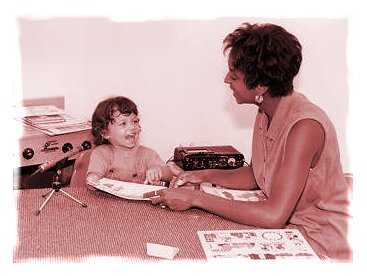 |
 |
 |
| Speech-language
pathologist records a speech sample from a young child |
Our center, the the University of Wisconsin-Madison department of Communicative Disorders, now uses Minidisc technology for our audio recording needs. We are a clinic devoted to assessment and treatment of communicative disorders (e.g., delayed speech/language, stuttering, etc.) and we usually record both testing and treatment sessions. We are interested in recording responses to test items as well as samples of spontaneous conversation and narrative. The speech samples are subjected to a variety of procedures, such as narrow phonetic transcription, analysis of language complexity, measures of speech intelligibility, etc.
The advantages of Minidisc over cassette recorders are the following: better and more reliable recordings; small, sturdy units (cassette repair was costing us $40-60/hour); inexpensive accessories (we use inexpensive Audiotechnica lapel mics and computer speakers for free field playback); reusable discs that allow editing; and ease of use, especially recharging while in use.
A unit can be placed in a vest pocket and worn by a toddler so that the child can move freely but still allow us to get a good recording of his or her speech. We predict less loss of quality of audio data stored on disc than on tape (an importance to researchers). Our preferences are the Sony MZ-R30 and MZ-R50, partly because they were our first models, but also because the larger units make the buttons a bit easier to access (esp. the MZ-R30). The types of changes available in ever newer and improved models are not advantages to us--as far as we can tell--because our needs are quite basic. The MZ-R70 has been a disappointment due to the mechanical noise it makes during playback.
Opinion: I feel MD technology could be marketed more broadly than it has been--think of the uses of the cassette: recording lectures, meetings, a music lesson, etc. The MD can do all this; it is not just another way to record music--though I've seen a few folks use it for recording a Hardanger fiddle master class.